formerly eScholarship Editions


|
|
|
|
Your search for
'Intellectual History' in subject
found 61 book(s). | Modify Search | Displaying 41 - 60 of 61 book(s) | |
| 41. | 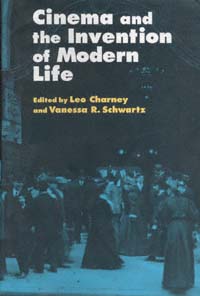 | Title: Cinema and the invention of modern life Author: Charney, Leo Published: University of California Press, 1996 Subjects: Cinema and Performance Arts | Film | Intellectual History | Popular Culture Publisher's Description: Casting aside the traditional conception of film as an outgrowth of photography, theater, and the novel, the essays in this volume reassess the relationship between the emergence of film and the broader culture of modernity. Contributors, leading scholars in film and cultural studies, link the popul . . . [more] Similar Items |
| 42. | 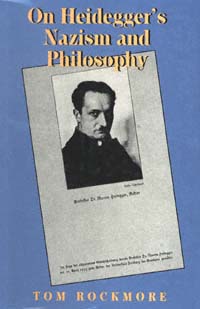 | Title: On Heidegger's Nazism and philosophy Author: Rockmore, Tom 1942- Published: University of California Press, 1991 Subjects: Philosophy | Social and Political Thought | German Studies | Intellectual History Publisher's Description: That Martin Heidegger supported National Socialism has long been common knowledge. Yet the relation between his philosophy and political commitments remains highly contentious and recently has erupted into a vociferous debate. Boldly refuting arguments that the philosopher's political stance was accidental or adopted under coercion, Rockmore argues that Heidegger's philosophical thought and his Nazism are inseparably intertwined, that he turned to National Socialism on the basis of his philosophy, and that his later evolution is largely determined by his continuing concern with Nazism.After developing a framework that clearly outlines the interrelation of Nazism and Heidegger's philosophy, Rockmore analyzes the famous rectoral address the philosopher delivered in 1933 upon becoming rector of the University of Freiburg. In that speech Heidegger sought to ground politics in philosophy. Rockmore examines the inseparable relation of politics and philosophy in Heidegger's Being and Time , the recently published Contributions to Philosophy (written from 1936 to 1938), and the interpretations of Hölderlin, Nietzsche, and technology.In his conclusion Rockmore considers the ongoing discussion of Heidegger's thought and Nazism in France. Combining extensive documentation of the Heidegger controversy with philosophical and historical analysis, this book raises profound questions about the social and political responsibility of philosophy. [brief] Similar Items |
| 43. | 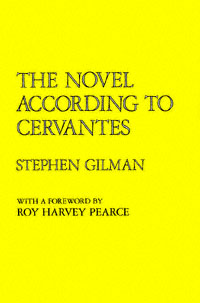 | Title: The novel according to Cervantes Author: Gilman, Stephen Published: University of California Press, 1989 Subjects: Literature | European Literature | European History | Literature in Translation | Intellectual History Similar Items |
| 44. |  | Title: Rethinking evil: contemporary perspectives Author: Lara, María Pía Published: University of California Press, 2001 Subjects: Philosophy | Ethics | Social and Political Thought | Intellectual History | Social Theory | Social Problems Publisher's Description: This innovative volume will be welcomed by moral and political philosophers, social scientists, and anyone who reflects seriously on the twentieth century's heavy burden of war, genocide, ethnic cleansing, and other evidence of people's desire to harm one another. María Pía Lara brings together a provocative set of essays that reexamine evil in the context of a "postmetaphysical" world, a world that no longer equates natural and human evil and no longer believes in an omnipotent God. The question of how and why God permits evil events to occur is replaced by the question of how and why humans perform radically evil acts. [brief] Similar Items |
| 45. | 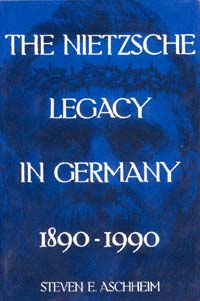 | Title: The Nietzsche legacy in Germany, 1890-1990 Author: Aschheim, Steven E 1942- Published: University of California Press, 1994 Subjects: German Studies | Intellectual History | Social and Political Thought | Politics | German Studies Publisher's Description: Countless attempts have been made to appropriate the ideas of Friedrich Nietzsche for diverse cultural and political ends, but nowhere have these efforts been more sustained and of greater consequence than in Germany. Aschheim offers a magisterial chronicle of the philosopher's presence in German li . . . [more] Similar Items |
| 46. |  | Title: Envisioning power: ideologies of dominance and crisis Author: Wolf, Eric R 1923- Published: University of California Press, 1999 Subjects: Anthropology | Social Theory | Social and Political Thought | Political Theory | Intellectual History Publisher's Description: With the originality and energy that have marked his earlier works, Eric Wolf now explores the historical relationship of ideas, power, and culture. Responding to anthropology's long reliance on a concept of culture that takes little account of power, Wolf argues that power is crucial in shaping the circumstances of cultural production. Responding to social-science notions of ideology that incorporate power but disregard the ways ideas respond to cultural promptings, he demonstrates how power and ideas connect through the medium of culture.Wolf advances his argument by examining three very different societies, each remarkable for its flamboyant ideological expressions: the Kwakiutl Indians of the Northwest Pacific Coast, the Aztecs of pre-Hispanic Mexico, and National Socialist Germany. Tracing the history of each case, he shows how these societies faced tensions posed by ecological, social, political, or psychological crises, prompting ideological responses that drew on distinctive, historically rooted cultural understandings. In each case study, Wolf analyzes how the regnant ideology intertwines with power around the pivotal relationships that govern social labor. Anyone interested in the history of anthropology or in how the social sciences make comparisons will want to join Wolf in Envisioning Power . [brief] Similar Items |
| 47. |  | Title: Downcast eyes: the denigration of vision in twentieth-century French thought Author: Jay, Martin 1944- Published: University of California Press, 1993 Subjects: Philosophy | Intellectual History | French Studies | Literary Theory and Criticism | Art Theory Publisher's Description: Long considered "the noblest of the senses," vision has increasingly come under critical scrutiny by a wide range of thinkers who question its dominance in Western culture. These critics of vision, especially prominent in twentieth-century France, have challenged its allegedly superior capacity to provide access to the world. They have also criticized its supposed complicity with political and social oppression through the promulgation of spectacle and surveillance.Martin Jay turns to this discourse surrounding vision and explores its often contradictory implications in the work of such influential figures as Jean-Paul Sartre, Maurice Merleau-Ponty, Michel Foucault, Jacques Lacan, Louis Althusser, Guy Debord, Luce Irigaray, Emmanuel Levinas, and Jacques Derrida. Jay begins with a discussion of the theory of vision from Plato to Descartes, then considers its role in the French Enlightenment before turning to its status in the culture of modernity. From consideration of French Impressionism to analysis of Georges Bataille and the Surrealists, Roland Barthes's writings on photography, and the film theory of Christian Metz, Jay provides lucid and fair-minded accounts of thinkers and ideas widely known for their difficulty.His book examines the myriad links between the interrogation of vision and the pervasive antihumanist, antimodernist, and counter-enlightenment tenor of much recent French thought. Refusing, however, to defend the dominant visual order, he calls instead for a plurality of "scopic regimes." Certain to generate controversy and discussion throughout the humanities and social sciences, Downcast Eyes will consolidate Jay's reputation as one of today's premier cultural and intellectual historians. [brief] Similar Items |
| 48. | 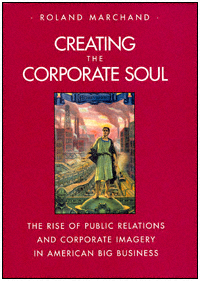 | Title: Creating the corporate soul: the rise of public relations and corporate imagery in American big business Author: Marchand, Roland Published: University of California Press, 1998 Subjects: History | American Studies | Popular Culture | Intellectual History | Media Studies | Economics and Business Publisher's Description: Over the course of the twentieth century the popular perception of America's giant corporations has undergone an astonishing change. Condemned as dangerous leviathans in the century's first decades, by 1945 major corporations had become respected, even revered, institutions. Roland Marchand's lavishly illustrated and carefully researched book tells how large companies such as AT&T and U.S. Steel created their own "souls" in order to reassure consumers and politicians that bigness posed no threat to democracy or American values.Marchand traces this important transformation in the culture of capitalism by offering a series of case studies of such corporate giants as General Motors, General Electric, Metropolitan Life Insurance, and Du Pont Chemicals. Marchand examines the rhetorical and visual imagery developed by corporate leaders to win public approval and build their own internal corporate culture. In the "golden era" of the 1920s, companies boasted of their business statesmanship, but in the Depression years many of them turned in desperation to forms of public relations that strongly defended the capitalist system. During World War II public relations gained new prominence within corporate management as major companies linked themselves with Main-Street, small-town America. By the war's end, the corporation's image as a "good neighbor" had largely replaced that of the "soulless giant." American big business had succeeded in wrapping increasingly complex economic relationships in the comforting aura of familiarity.Marchand, author of the widely acclaimed Advertising the American Dream (1985), provides an elegant and convincing account of the origins and effects of the corporate imagery so ubiquitous in our world today. [brief] Similar Items |
| 49. |  | Title: Hellenistic philosophy of mind Author: Annas, Julia Published: University of California Press, 1994 Subjects: Classics | Social and Political Thought | Intellectual History | Classical Philosophy | Philosophy | Rhetoric Publisher's Description: Hellenistic Philosophy of Mind is an elegant survey of Stoic and Epicurean ideas about the soul - an introduction to two ancient schools whose belief in the soul's physicality offer compelling parallels to modern approaches in the philosophy of mind. Annas incorporates recent thinking on Hellenistic philosophy of mind so lucidly and authoritatively that specialists and nonspecialists alike will find her book rewarding.In part, the Hellenistic epoch was a "scientific" period that broke with tradition in ways that have an affinity with the modern shift from the seventeenth and eighteenth centuries to the present day. Hellenistic philosophy of the soul, Annas argues, is in fact a philosophy of mind, especially in the treatment of such topics as perception, thought, and action. [brief] Similar Items |
| 50. | 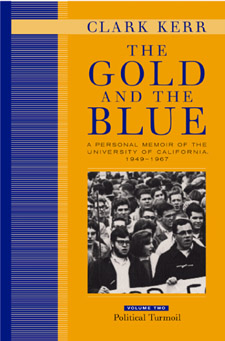 | Title: The gold and the blue: a personal memoir of the University of California, 1949-1967 Author: Kerr, Clark 1911- Published: University of California Press, 2003 Subjects: Autobiographies and Biographies | California and the West | History | Intellectual History Publisher's Description: The Los Angeles Times called the first volume of The Gold and the Blue "a major contribution to our understanding of American research universities." This second of two volumes continues the story of one of the last century's most influential figures in higher education. A leading visionary, architect, leader, and fighter for the University of California, Clark Kerr was chancellor of the Berkeley campus from 1952 to 1958 and president of the university from 1958 to 1967. He saw the university through its golden years - a time of both great advancement and great conflict. This absorbing memoir is an intriguing insider's account of how the University of California rose to the peak of scientific and scholarly stature and how, under Kerr's unique leadership, it evolved into the institution it is today. In Volume II: Political Turmoil, Kerr turns to the external and political environment of the 1950s and 1960s, contrasting the meteoric rise of the University of California to the highest pinnacle of academic achievement with its troubled political context. He describes his attempts to steer a middle course between attacks from the political Right and Left and discusses the continuing attacks on the university, and on him personally, by the state Un-American Activities Committee. He provides a unique point of view of the Free Speech Movement on the Berkeley campus in the fall of 1964. He also details the events of January 1967, when he was dismissed as president of the university by the Board of Regents. [brief] Similar Items |
| 51. | 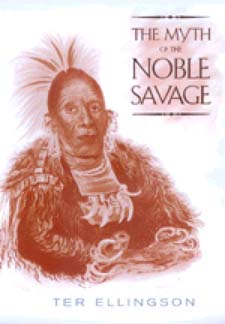 | Title: The myth of the noble savage Author: Ellingson, Terry Jay Published: University of California Press, 2001 Subjects: Anthropology | Cultural Anthropology | Intellectual History | European History | American Studies | European Studies | Postcolonial Studies Publisher's Description: In this important and original study, the myth of the Noble Savage is an altogether different myth from the one defended or debunked by others over the years. That the concept of the Noble Savage was first invented by Rousseau in the mid-eighteenth century in order to glorify the "natural" life is easily refuted. The myth that persists is that there was ever, at any time, widespread belief in the nobility of savages. The fact is, as Ter Ellingson shows, the humanist eighteenth century actually avoided the term because of its association with the feudalist-colonialist mentality that had spawned it 150 years earlier. The Noble Savage reappeared in the mid-nineteenth century, however, when the "myth" was deliberately used to fuel anthropology's oldest and most successful hoax. Ellingson's narrative follows the career of anthropologist John Crawfurd, whose political ambition and racist agenda were well served by his construction of what was manifestly a myth of savage nobility. Generations of anthropologists have accepted the existence of the myth as fact, and Ellingson makes clear the extent to which the misdirection implicit in this circumstance can enter into struggles over human rights and racial equality. His examination of the myth's influence in the late twentieth century, ranging from the World Wide Web to anthropological debates and political confrontations, rounds out this fascinating study. [brief] Similar Items |
| 52. | 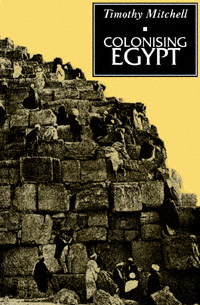 | Title: Colonising Egypt Author: Mitchell, Timothy 1955- Published: University of California Press, 1991 Subjects: Politics | Middle Eastern Studies | Cultural Anthropology | Middle Eastern History | Intellectual History | Postcolonial Studies Publisher's Description: Extending deconstructive theory to historical and political analysis, Timothy Mitchell examines the peculiarity of Western conceptions of order and truth through a re-reading of Europe's colonial encounter with nineteenth-century Egypt. Similar Items |
| 53. | 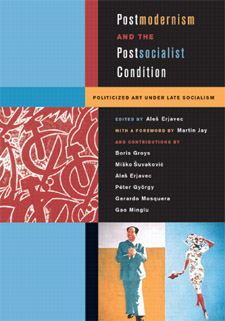 | Title: Postmodernism and the postsocialist condition: politicized art under late socialism Author: Erjavec, Aleš Published: University of California Press, 2003 Subjects: Art | Art History | Art Theory | Intellectual History | Russian and Eastern European Studies Publisher's Description: The Berlin Wall was coming down, the Soviet Union was dissolving, Communist China was well on its way down the capitalist path; the world was witnessing political and social transformations without precedent. Artists, seeing it all firsthand, responded with a revolution of their own. What form this revolution took - how artists in the 1980s marked their societies' traumatic transition from decaying socialism to an insecure future - emerges in this remarkable volume. With in-depth perspectives on art and artists in the former Soviet Union, the Balkans and Mitteleuropa, China, and Cuba - all from scholars and art critics who were players in the tumultuous cultural landscapes they describe - this stunningly illustrated collection captures a singular period in the history of world art, and a critical moment in the cultural and political transition from the last century to our own. Authors Ales Erjavec, Gao Minglu, Boris Groys, Péter György, Gerardo Mosquera, and Misko Suvakovic observe distinct national differences in artistic responses to the social and political challenges of the time. But their essays also reveal a clear pattern in the ways in which artists registered the exhaustion of the socialist vision and absorbed the influence of art movements such as constructivism, pop art, and conceptual art, as well as the provocations of western pop culture. Indebted to but not derived from capitalist postmodernism, the result was a unique version of postsocialist postmodernism, an artistic/political innovation clearly identified and illustrated for the first time in these pages. [brief] Similar Items |
| 54. | 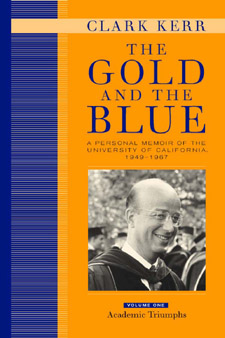 | Title: The gold and the blue: a personal memoir of the University of California, 1949-1967 Author: Kerr, Clark 1911- Published: University of California Press, 2001 Subjects: History | California and the West | Intellectual History | Californian and Western History | Autobiography Publisher's Description: One of the last century's most influential figures in higher education, Clark Kerr was a leading visionary, architect, leader, and fighter for the University of California. Chancellor of the Berkeley campus from 1952 to 1958 and president of the university from 1958 to 1967, Kerr saw the university through its golden years--a time of both great advancement and great conflict. This absorbing memoir is an intriguing insider's account of how the University of California rose to the peak of scientific and scholarly stature and how, under Kerr's unique leadership, the university evolved into the institution it is today. In this first of two volumes, Kerr describes the private life of the university from his first visit to Berkeley as a graduate student at Stanford in 1932 to his dismissal under Governor Ronald Reagan in 1967. Early in his tenure as a professor, the Loyalty Oath issue erupted, and the university, particularly the Berkeley campus, underwent its most difficult upheaval until the onset of the Free Speech Movement in 1964. Kerr discusses many pivotal developments, including the impact of the GI Bill and the evolution of the much-emulated 1960 California Master Plan for Higher Education. He also discusses the movement for universal access to education and describes the establishment and growth of each of the nine campuses and the forces and visions that shaped their distinctive identities. Kerr's perspective of more than fifty years puts him in a unique position to assess which of the academic, structural, and student life innovations of the 1950s and 1960s have proven successful and to consider what lessons about higher education we might learn from that period. The second volume of the memoir will treat the public life of the university and the political context that conditioned its environment. [brief] Similar Items |
| 55. | 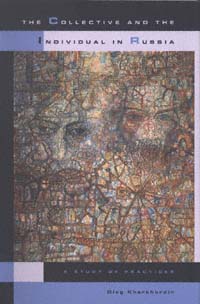 | Title: The collective and the individual in Russia: a study of practices Author: Kharkhordin, Oleg 1964- Published: University of California Press, 1999 Subjects: History | Social Theory | European History | Russian and Eastern European Studies | Intellectual History Publisher's Description: Oleg Kharkhordin has constructed a compelling, subtle, and complex genealogy of the Soviet individual that is as much about Michel Foucault as it is about Russia. Examining the period from the Russian Revolution to the fall of Gorbachev, Kharkhordin demonstrates that Party rituals - which forced each Communist to reflect intensely and repeatedly on his or her "self," an entirely novel experience for many of them - had their antecedents in the Orthodox Christian practices of doing penance in the public gaze. Individualization in Soviet Russia occurred through the intensification of these public penitential practices rather than the private confessional practices that are characteristic of Western Christianity. He also finds that objectification of the individual in Russia relied on practices of mutual surveillance among peers, rather than on the hierarchical surveillance of subordinates by superiors that characterized the West. The implications of this book expand well beyond its brilliant analysis of the connection between Bolshevism and Eastern Orthodoxy to shed light on many questions about the nature of Russian society and culture. [brief] Similar Items |
| 56. | 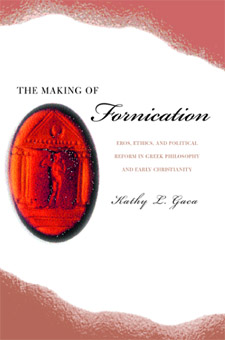 | Title: The making of fornication: eros, ethics, and political reform in Greek philosophy and early Christianity Author: Gaca, Kathy L Published: University of California Press, 2003 Subjects: Classics | Classical Philosophy | Classical Religions | Classical Politics | Christianity | Ethics | Social and Political Thought | Ancient History | Intellectual History Publisher's Description: This provocative work provides a radical reassessment of the emergence and nature of Christian sexual morality, the dominant moral paradigm in Western society since late antiquity. While many scholars, including Michel Foucault, have found the basis of early Christian sexual restrictions in Greek ethics and political philosophy, Kathy L. Gaca demonstrates on compelling new grounds that it is misguided to regard Greek ethics and political theory - with their proposed reforms of eroticism, the family, and civic order - as the foundation of Christian sexual austerity. Rather, in this thoroughly informed and wide-ranging study, Gaca shows that early Christian goals to eradicate fornication were derived from the sexual rules and poetic norms of the Septuagint, or Greek Bible, and that early Christian writers adapted these rules and norms in ways that reveal fascinating insights into the distinctive and largely non-philosophical character of Christian sexual morality. Writing with an authoritative command of both Greek philosophy and early Christian writings, Gaca investigates Plato, the Stoics, the Pythagoreans, Philo of Alexandria, the apostle Paul, and the patristic Christians Clement of Alexandria, Tatian, and Epiphanes, freshly elucidating their ideas on sexual reform with precision, depth, and originality. Early Christian writers, she demonstrates, transformed all that they borrowed from Greek ethics and political philosophy to launch innovative programs against fornication that were inimical to Greek cultural mores, popular and philosophical alike. The Septuagint's mandate to worship the Lord alone among all gods led to a Christian program to revolutionize Gentile sexual practices, only for early Christians to find this virtually impossible to carry out without going to extremes of sexual renunciation. Knowledgeable and wide-ranging, this work of intellectual history and ethics cogently demonstrates why early Christian sexual restrictions took such repressive ascetic forms, and casts sobering light on what Christian sexual morality has meant for religious pluralism in Western culture, especially among women as its bearers. [brief] Similar Items |
| 57. | 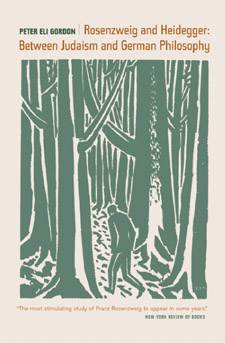 | Title: Rosenzweig and Heidegger: between Judaism and German philosophy Author: Gordon, Peter Eli Published: University of California Press, 2003 Subjects: History | German Studies | Religion | Judaism | European History | Intellectual History | Jewish Studies | Social and Political Thought Publisher's Description: Franz Rosenzweig (1886-1929) is widely regarded today as one of the most original and intellectually challenging figures within the so-called renaissance of German-Jewish thought in the Weimar period. The architect of a unique kind of existential theology, and an important influence upon such philosophers as Walter Benjamin, Martin Buber, Leo Strauss, and Emmanuel Levinas, Rosenzweig is remembered chiefly as a "Jewish thinker," often to the neglect of his broader philosophical concerns. Cutting across the artificial divide that the traumatic memory of National Socialism has drawn between German and Jewish philosophy, this book seeks to restore Rosenzweig's thought to the German philosophical horizon in which it first took shape. It is the first English-language study to explore Rosenzweig's enduring debt to Hegel's political theory, neo-Kantianism, and life-philosophy; the book also provides a new, systematic reading of Rosenzweig's major work, The Star of Redemption. Most of all, the book sets out to explore a surprising but deep affinity between Rosenzweig's thought and that of his contemporary, the German philosopher Martin Heidegger. Resisting both apologetics and condemnation, Gordon suggests that Heidegger's engagement with Nazism should not obscure the profound and intellectually compelling bond in the once-shared tradition of modern German and Jewish thought. A remarkably lucid discussion of two notably difficult thinkers, this book represents an eloquent attempt to bridge the forced distinction between modern Jewish thought and the history of modern German philosophy - and to show that such a distinction cannot be sustained without doing violence to both. [brief] Similar Items |
| 58. |  | Title: Letters from freedom: post-cold war realities and perspectives Author: Michnik, Adam Published: University of California Press, 1998 Subjects: History | Politics | Russian and Eastern European Studies | Social and Political Thought | European History | Intellectual History Publisher's Description: A hero to many, Polish writer Adam Michnik ranks among today's most fearless and persuasive public figures. His imprisonment by Poland's military regime in the 1980s did nothing to quench his outpouring of writings, many of which were published in English as Letters from Prison . Beginning where that volume ended, Letters from Freedom finds Michnik briefly in prison at the height of the "cold civil war" between authorities and citizens in Poland, then released. Through his continuing essays, articles, and interviews, the reader can follow all the momentous changes of the last decade in Poland and East-Central Europe. Some of the writings have appeared in English in various publications; most are translated here for the first time.Michnik is never detached. His belief that people can get what they want without hatred and violence has always translated into action, and his actions, particularly the activity of writing, have required his contemporaries to think seriously about what it is they want. His commitment to freedom is absolute, but neither wild-eyed nor humorless; with a characteristic combination of idealism and pragmatism, Michnik says, "In the end, politics is the art of foreseeing and implementing the possible."Michnik's blend of conviction and political acumen is perhaps most vividly revealed in the interviews transcribed in the book, whether he is the subject of the interview or is conducting a conversation with Czeslaw Milosz, Vacláv Havel, or Wojciech Jaruzelski. These face-to-face exchanges tell more about the forces at work in contemporary Eastern Europe than could any textbook. Sharing Michnik's intellectual journey through a tumultuous era, we touch on all the subjects important to him in this wide-ranging collection and find they have importance for everyone who values conscience and responsibility. In the words of Jonathan Schell, "Michnik is one of those who bring honor to the last two decades of the twentieth century." [brief] Similar Items |
| 59. | 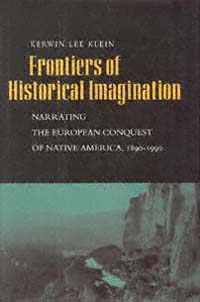 | Title: Frontiers of historical imagination: narrating the European conquest of native America, 1890-1990 Author: Klein, Kerwin Lee 1961- Published: University of California Press, 1997 Subjects: History | California and the West | American Studies | Anthropology | United States History | Intellectual History | Postcolonial Studies Publisher's Description: The American frontier, a potent symbol since Europeans first stepped ashore on North America, serves as the touchstone for Kerwin Klein's analysis of the narrating of history. Klein explores the traditions through which historians, philosophers, anthropologists, and literary critics have understood the story of America's origin and the way those understandings have shaped and been shaped by changing conceptions of history. The American West was once the frontier space where migrating Europe collided with Native America, where the historical civilizations of the Old World met the nonhistorical wilds of the New. It was not only the cultural combat zone where American democracy was forged but also the ragged edge of History itself, where historical and nonhistorical defied and defined each other. Klein maintains that the idea of a collision between people with and without history still dominates public memory. But the collision, he believes, resounds even more powerfully in the historical imagination, which creates conflicts between narration and knowledge and carries them into the language used to describe the American frontier. In Klein's words, "We remain obscurely entangled in philosophies of history we no longer profess, and the very idea of 'America' balances on history's shifting frontiers." [brief] Similar Items |
| 60. | 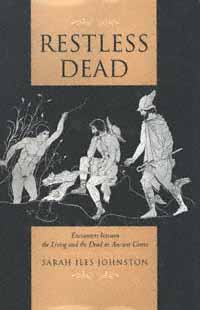 | Title: Restless dead: encounters between the living and the dead in ancient Greece Author: Johnston, Sarah Iles 1957- Published: University of California Press, 1999 Subjects: Classics | Classical Religions | Classical Literature and Language | Intellectual History | Folklore and Mythology | Cultural Anthropology Publisher's Description: During the archaic and classical periods, Greek ideas about the dead evolved in response to changing social and cultural conditions - most notably changes associated with the development of the polis, such as funerary legislation, and changes due to increased contacts with cultures of the ancient Near East. In Restless Dead , Sarah Iles Johnston presents and interprets these changes, using them to build a complex picture of the way in which the society of the dead reflected that of the living, expressing and defusing its tensions, reiterating its values and eventually becoming a source of significant power for those who knew how to control it. She draws on both well-known sources, such as Athenian tragedies, and newer texts, such as the Derveni Papyrus and a recently published lex sacra from Selinous.Topics of focus include the origin of the goes (the ritual practitioner who made interaction with the dead his specialty), the threat to the living presented by the ghosts of those who died dishonorably or prematurely, the development of Hecate into a mistress of ghosts and its connection to female rites of transition, and the complex nature of the Erinyes. Restless Dead culminates with a new reading of Aeschylus' Oresteia that emphasizes how Athenian myth and cult manipulated ideas about the dead to serve political and social ends. [brief] Similar Items |